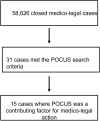Medico-legal risks of point-of-care ultrasound: a closed-case analysis of Canadian Medical Protective Association medico-legal cases
- PMID: 38396310
- PMCID: PMC10891006
- DOI: 10.1186/s13089-024-00364-7
Medico-legal risks of point-of-care ultrasound: a closed-case analysis of Canadian Medical Protective Association medico-legal cases
Abstract
Background: Point-of-care ultrasound (POCUS) has become a core diagnostic tool for many physicians due to its portability, excellent safety profile, and diagnostic utility. Despite its growing use, the potential risks of POCUS use should be considered by providers. We analyzed the Canadian Medical Protective Association (CMPA) repository to identify medico-legal cases arising from the use of POCUS.
Methods: We retrospectively searched the CMPA closed-case repository for cases involving diagnostic POCUS between January 1st, 2012 and December 31st, 2021. Cases included civil-legal actions, medical regulatory authority (College) cases, and hospital complaints. Patient and physician demographics, outcomes, reason for complaint, and expert-identified contributing factors were analyzed.
Results: From 2012 to 2021, there were 58,626 closed medico-legal cases in the CMPA repository with POCUS determined to be a contributing factor for medico-legal action in 15 cases; in all cases the medico-legal outcome was decided against the physicians. The most common reasons for patient complaints were diagnostic error, deficient assessment, and failure to perform a test or intervention. Expert analysis of these cases determined the most common contributing factors for medico-legal action was failure to perform POCUS when indicated (7 cases, 47%); however, medico-legal action also resulted from diagnostic error, incorrect sonographic approach, deficient assessment, inadequate skill, inadequate documentation, or inadequate reporting.
Conclusions: Although the most common reason associated with the medico-legal action in these cases is failure to perform POCUS when indicated, inappropriate use of POCUS may lead to medico-legal action. Due to limitations in granularity of data, the exact number of civil-legal, College cases, and hospital complaints for each contributing factor is unavailable. To enhance patient care and mitigate risk for providers, POCUS should be carefully integrated with other clinical information, performed by providers with adequate skill, and carefully documented.
Keywords: Legal; Medcio-legal; POCUS; Patient safety; Point-of-care ultrasound; Ultrasound.
© 2024. The Author(s).
Conflict of interest statement
None of the authors have relevant competing to disclose.
References
-
- Ma IWY, Steinmetz P, Weerdenburg K, Woo MY, Olszynski P, Heslop CL, et al. The Canadian medical student ultrasound curriculum: a statement from the Canadian ultrasound consensus for undergraduate medical education group. J Ultrasound Med. 2020;39(7):1279–1287. doi: 10.1002/jum.15218. - DOI - PMC - PubMed
LinkOut - more resources
Full Text Sources

